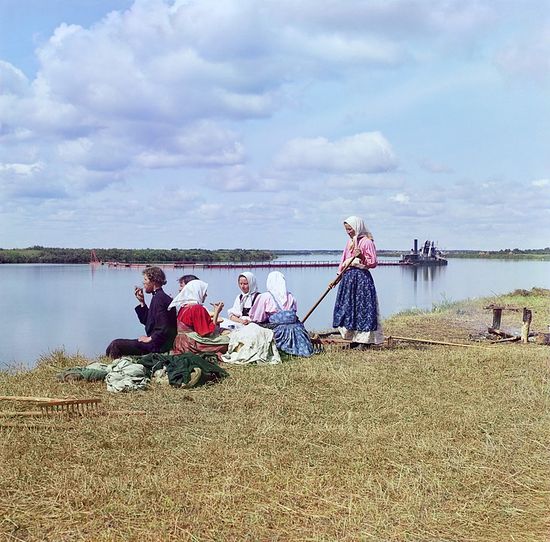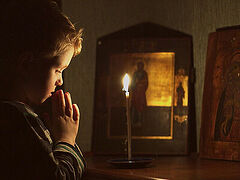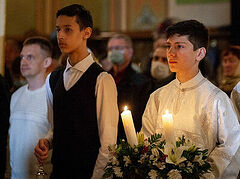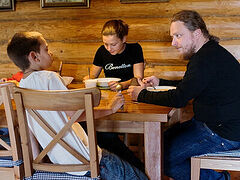 S.M.Prokudin-Gorsky. A group of children.1909.
S.M.Prokudin-Gorsky. A group of children.1909.
The elders of Optina left many instructions about married life, family relationships, and the upbringing of children.
Venerable Leo advised his spiritual daughter that if she has any disagreement with her mother, especially if the she is at fault, she should ask her mother’s forgiveness as soon as possible:
“If you happened to grieve your mother in any way, make haste and fall down before her weary feet, for she labored hard to bring you up; and seek her forgiveness. As soon you push yourself and do it, you will unburden your conscience in every way and our enemy the devil himself will be put to shame!”
St. Macarius taught people to accept anything that comes their way with humility and remorse, especially if it comes from their parents:
“Accept with remorse and humility anything that happens to you, especially if it comes from your parents, since you are living with them these days. Honor your father and your mother, the Lord commanded (Ex. 20:12); the law of nature and civil laws require us to do so, as well. A parental blessing affords a great benefit to the children, because it brings down God’s blessing upon them.”
St. Ambrose reminded people of the need to teach the children to cross themselves frequently, for this has enormous power and has saved a great many people from terrible disasters and dangers:
“Centuries of experience suggest that the sign of the cross has great power over all a man’s actions throughout his life. Therefore, it is necessary to instill in children the habit of repeatedly guarding themselves with the sign of the cross, especially before they sit down to eat or take a drink, before going to bed and after they get up, before leaving on a trip, and before going outside or entering any place. The children shouldn’t cross themselves carelessly or fancily, but they should do it with precision, beginning from the forehead down to the chest and then to both shoulders, so that it be a properly-shaped cross. Crossing one’s self for protection has saved many people from great troubles and dangers.”
Elder Ambrose also taught what we should do to avoid disagreements between spouses on issues of child rearing. He offered the following answer to a similar question in a letter:
“In the event of a disagreement, it is better to either steer away from the conversation or simply leave, or make it look as if you didn’t quite understand it; but never argue about your differing views in front of the children.”
St. Barsonuphius admonished parents to instruct children in the Orthodox faith, reminding mothers that their words hold creative power, as they originate deep in their hearts:
“The fact that your son doesn’t attend church can also be rectified. Tell him simply, I say, that he must attend church. A simple word, but spoken from your heart, wields major influence on a person—while clever words spoken insincerely are worthless. It is the same as if you were blowing air out of the window and against the wind—what’s the point? A mother’s words hold creative power, as they come from the very depths of her heart. The words of a spiritual father bear great power, too.”
St. Barsonuphius also explained that a woman can’t live without faith and advised the women to try and fix their husbands’ focus on the Lord:
“A woman can’t live without faith. She will either regain her faith in God after temporary unbelief, or quickly become demoralized. A man is a different story—he can live without faith. His heart will turn into stone, and he will become a pillar of salt—and he will continue living like that. But a woman won’t be able to.”
“So you, the women, should strive to fix your husbands’ focus on the Lord, thus saving both your and their souls. In all the trials of life, appeal to the Savior with faith; He will never forsake you. Truly, faith works miracles.”
St. Barsonuphius warned about the destructive power of swearing in the family, and how dangerous it was to curse someone, or even something. The elder offered the following story as an example:
“Some saints exhibited a characteristic trait—to invite guests, meet them cordially and then treat them to a meal; and His Eminence Bishop Athanasius was known for such trait. He enjoyed having guests at his house on feast days. And so, one day he did just that.
“Immediately following the Liturgy, he and his guests arrived at his house. After drinking tea and talking to his guests, His Grace invited them to share a meal. They sat down at the table and he ordered the attendant to serve lunch. A huge, perfectly cooked pike was brought in. When he saw it, Vladyka said, “We can’t eat it: It was cursed.” Everyone stared at the eminent pastor in wonder. “It's cursed, it cannot be consumed,” repeated Vladyka. He called on his cell attendant and asked him to remove the fish from the table. The latter didn’t even dare to pick it up.
“Bishop Athanasius summoned the cook. He arrived. Vladyka looked at him, and at the sight of his bandaged finger, asked, ‘What happened to your finger?’ ‘I accidentally cut it, Vladyka.’ ‘And what did you say when you cut it?’ ‘Forgive me, Vladyka, I said: Dammit... I used foul words...’ ‘So, you see now, we can't eat it. Throw this one away and cook another one for us’.
"You see, even the curse of a simple man like a cook can hold much power...
"A cook’s curse transformed the fish in such a way that Bishop Athanasius could perceive it by his all-knowing spiritual insight. Because of these changes, the fish was no longer edible. This explains why the most expensive dishes served in worldly, wealthy homes don’t have the flavor we enjoy in our [monastery’s] sour cabbage soup—their meals are prepared without prayer, but rather with scolding and cursing, whereas in our monastery we cook the meals with prayer and blessings.”
Marriages frequently break up in our days and the number of divorces is huge. The elders of Optina taught us to forgive each other’s mistakes and offenses and repair relationships with love.
St. Leo advised to use all means possible to find reconciliation in the event of a family feud, for it is pleasing to God:
“Feeling deceitful and disturbed by evil thoughts, you ask me whether you should write to your husband or not. I will answer to this as follows: First of all, try to grasp what’s going on deep inside your heart and identify your way of thinking—how do you treat your husband? Are you feeling peaceful about him or not, have you given him any reason to break matrimonial ties with you, and so on? If you find anything of this kind in your heart, then you need to apply all possible means to restore peace—for it is pleasing to God. But even if you were right, in humility you should make an effort to reconcile with him and help him to return—not even for your sake, for God’s. So then, do not waste time but act right away and the Lord will not forsake you.”
Interestingly, the elder advised this married woman to take the first step in seeking reconciliation, whereas on another occasion, he advised her husband to initiate reconciliation as the “master” of his house:
“I observed the miserable state of your family, and in spite of my extremely poor health, grieved greatly for the situation you are in. But I ask and beseech you, most honorable Foma Nikitych, since you are the master of your household, then do try to initiate conversation as compassionately and mercifully as possible—not with zealous pride, but in the spirit of humility and meekness. But the Almighty God is all-powerful to amend your affairs, both spiritual and physical, and restore peace, tranquility, and calm to your household.”
Therefore, the elder taught that both spouses must humble down, suggesting that the wife take heed to have humility, and the husband, as the head of the family, to take the first steps towards reconciliation in a spirit of humility and meekness. It appears that St. Leo taught both spouses to submit to one another, remembering their vows: The wife must obey her husband, and the husband must remember that the strong one should be able to yield before the weak.
St. Anthony reminded people of patience in the family life and taught to wholeheartedly surrender to the will of God; and if either a husband or a wife doesn’t seem good enough, they must pause to think whether they are worthy of truly good and perfect spouses, or whether they themselves are ideal:
“Peace of mind comes as a result of our complete surrender to the will of God, and without it nothing was made that was made. Even if your husband is really no good, ask yourself in all fairness and truth before God, ‘Can I, a sinner, be truly worthy of a good and kind husband?’
“In response, your conscience will certainly say that you aren’t worthy of anything good, and then, in humility of heart and in obedience to the will of God, you will heartily love him and discover a great many good traits of his that you never saw before. Even though it’s not so hard in our ‘wise’ times to dissolve a marriage union because of carelessness and inexperience, think about your answer at the Dread Judgment of God. For it is God Who unites people in matrimony; therefore, judge for yourselves which is better—patience or impatience!”
 S.M.Prokudin-Gorsky. Lunch at hayfield. 1909.
S.M.Prokudin-Gorsky. Lunch at hayfield. 1909.
St. Anthony spoke of like-mindedness and familial love as the mercy of God:
“As I read your letters and observed the unity you shared with your dearest beloved one and your mutual love for one another, I rejoiced in this and gave thanks to the Lord our God, Who crowned you with His rich mercy: that is, like-mindedness and familial love. For it is rightly said that if the husband and wife enjoy peace, they won’t need any other treasure.”
St. Macarius noted that if family members are locked in a quarrel, they must first reproach themselves —otherwise they won’t make peace:
“It is truly regrettable to hear of troubles between close relatives… and, because of how we are made, no matter how much advice we receive, the arguing sides won’t make peace without first feeling remorseful. The problem is they have no idea how they need to reproach themselves—they only see their neighbor's guilt.”
Childbirth
The Optina elders were asked at times to pray for help in childbirth and all sorts of concerns regarding childbirth. Elder Ambrose would respond to such letters:
“There is an Orthodox tradition that in such cases we appeal to the Mother of God, specifically to the icon called Feodorovskaya.
Acquire or order this icon to be painted for your use; it is commemorated twice a year, on March 14 and August 16. If you wish, you can have a prayer vigil served in your house on the eve of the feast days and, on the day of the feast, hold a prayer service with the Akathist to the Mother of God. If you have the zeal, you can hold services at other times, whenever you wish.
You can also pray to the Queen of Heaven daily by reciting “Rejoice, O Virgin Mother of God” at least twelve times a day, and you may also add bows from the waist. You may also read the kontakion to Her the same number of times: “We have no other help, we have no other hope but Thee, O Lady. Help us, for in Thee do we hope, and of Thee we boast, for we are Your servants. Let us not be put to shame.”
Drunkenness
Drunkenness is a great misfortune for a family. St. Leo wrote in this regard:
“This passion is allowed either because of pride and arrogance, or for violation of conscience against holy matrimony; therefore, it is necessary... at first, to feel compelled in every possible way to humble yourself or have confession and truly repent before an experienced father confessor—for you will then receive help from the Lord.”
The elder sternly pointed out in a letter to his spiritual child and advised or even commanded him to quit drinking:
“May God grant that your household be established in piety and that in your joy you might quit taking to the bottle. We know, and the Russian proverb confirms, that “Bottoms up will do no good.” I have advised and directed you as your spiritual father to quit drinking—it is so bad, too bad. You will run into trouble and be under bondage; or worse, brother, I will have to order you to do monastic prostrations, so that you could pray for your namesake Holy Hierarch Nicholas’s help to relieve you from the sin of drunkenness.”
Elder Ambrose counseled to pray to St. John the Baptist and the Holy Martyr Boniface for someone who drinks:
“You write that your husband is excessively given to drinking wine... Pray with faith and zeal for him to St. John, the Baptist of the Lord, and to the martyr Boniface, that our All-Merciful Lord, through the prayers of His God-pleasing saints, turn him away from the path of perdition in ways only known to Him, and restore him to a temperate and sober life.”
The Optina elders also gave answers to specific questions and offered spiritual advice with regards to various family circumstances. This advice is applicable in our day, too, because spiritual wisdom never ages.
Property disputes
Regarding property disputes among relatives, St. Ambrose wrote:
“Place all your hope in God, Who in His all-good Providence arranges everything for our good. Use this thought as a guide in the relationship with your relatives. If the Lord makes it known to them, they will repay what is due, though not all of them; if they don’t repay, it is better to accept help from strangers than to quarrel with your own people. As for their benefit, leave it to them: may each do as he pleases.”
Seek faith
It seems fitting to conclude this small selection from letters and sayings of the Optina elders with a story told by St. Barsonuphius. This story is truly relevant for our time, when people often seek wealth, fame, and power, but never seek what’s most important: faith. Without Christ, there is neither life nor salvation:
“In these times, many people are led by the desires of their flesh but never seek out spiritual joy. What do they seek before everything else? First of all, wealth. Then fame. There are no means to which they won’t stoop in order to acquire this. The Lord said: And because lawlessness will abound, the love of many will grow cold (Matt. 24:12). Most people have turned away from Christ. Those who do not share these views are called backward or impractical... I sometimes ask those who come to see me:
“Do you have children?”
“Of course,” they say, “we have sons and daughters.”
“How do you want to arrange their lives?”
“Well, I want my son to be an engineer, for he has an inclination for it; as for my daughters, I want them to marry rich and noble men.”
“Do you think they will be happy?”
“'Certainly!' they confidently respond, but are never concerned about making an effort to lead their children to seek salvation in Christ. They say that money can buy everything . Yes, indeed; although not exactly everything—many things can be bought with money, but you can’t buy Christ for all the money in the world. And without Christ, there is neither life, nor salvation.”



